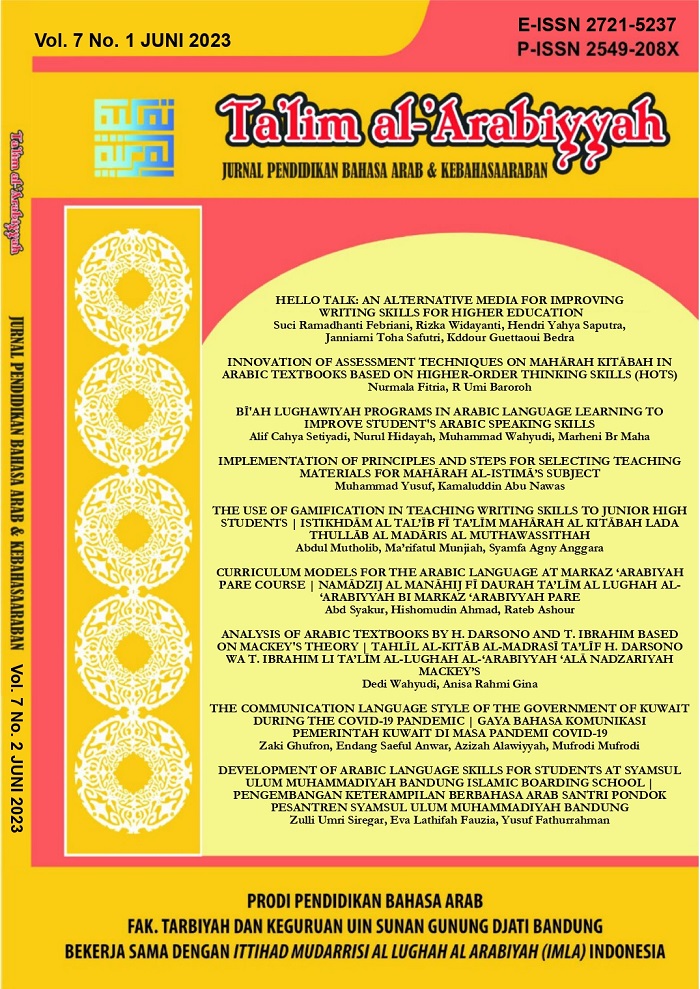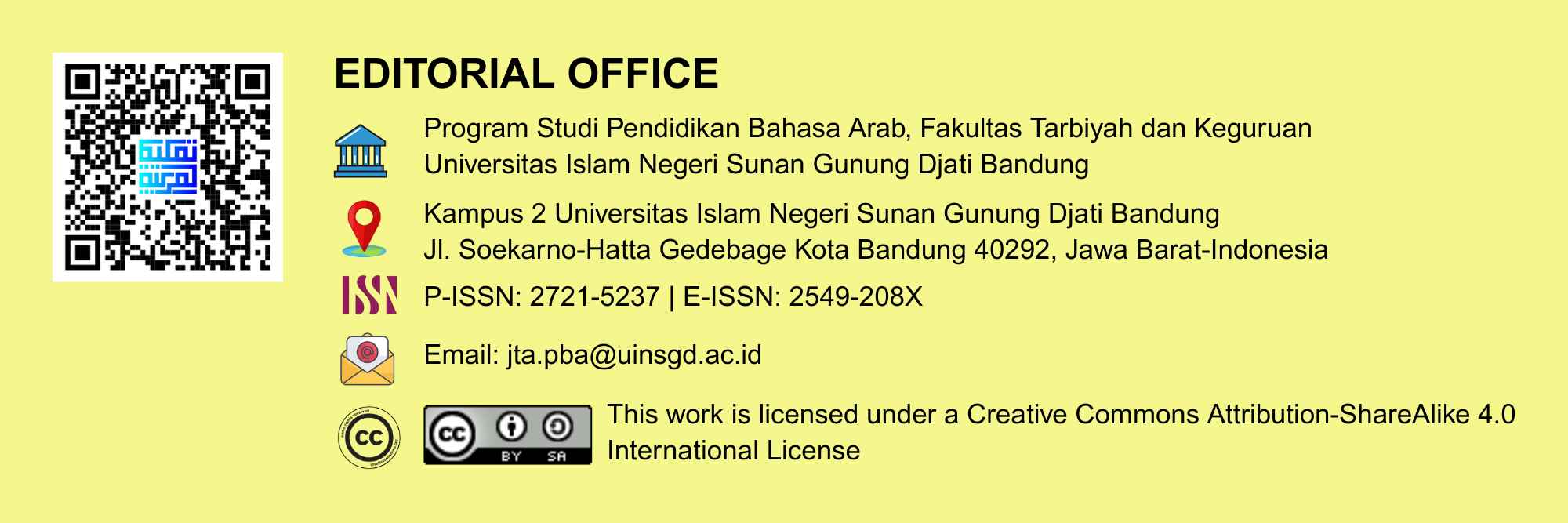The Use of Gamification in Teaching Writing Skills to Junior High Students | IstikhdÄm Al Tal’īb FÄ« Ta’lÄ«m MahÄrah Al KitÄbah Lada ThullÄb Al MadÄris Al Muthawassithah
DOI:
https://doi.org/10.15575/jpba.v7i1.23894Keywords:
Arabic Learning, Gamification, Junior High School, Writing SkillAbstract
Writing as a language skill is still considered a language skill that is categorized as very difficult. Various kinds of problems arise in learning to write Arabic because writing skills are skills that combine various disciplines. Therefore, teachers must continually innovate in the learning process, such as choosing a learning model or using various learning methods, one of which is gamification-based Arabic learning. Gamification is a modern educational strategy popular in the West, namely educational stimulation by applying game elements and principles in non-game contexts. This article describes Gamification's use in teaching high school students writing skills. The research method used is the descriptive method with the desk research method. The results of the study show that the use of Gamification in teaching writing skills can improve the quality of learning, especially in Arabic, so that students can master writing skills in an easy and fun way, and can lead to the development of teaching writing skills in a social context following their interests, motivations, and needs Student. This study recommends further research to test the effectiveness of Gamification on other Arabic language skills with a more varied research method.
References
Abdelhamid, I. Y., Yahaya, H., & Shaharuddin, H. N. (2023). Assessing the Impact of Gamification on Academic Achievement and Student Perceptions of Learning Arabic Grammar: A Quasi-Experimental Study. International Journal of Research in Business and Social Science, 13(5), 760–773. http://dx.doi.org/10.6007/IJARBSS/v13-i5/16862
Ali, J. (2018). Outbound as The Alternative Method to Have Fun Arabic Learning. Alsinatuna, 3(2), 244–261. https://doi.org/10.28918/alsinatuna.v3i2.1276
Anastasiadis, T., Lampropoulos, G., & Siakas, K. (2018). Digital Game-Based Learning and Serious Games in Education. International Journal of Advances in Scientific Research and Engineering, 4(12), 139–144. https://doi.org/10.31695/IJASRE.2018.33016
Arifin, A. (2017). Peranan Permainan Bahasa Dalam Proses Kegiatan Belajar Mengajar Mata Pelajaran Bahasa Arab. An Nabighoh, 19(2), 302–318. https://doi.org/10.32332/an-nabighoh.v19i2.1005
Asrofi, I., & Halim, A. (2021). Efektivitas Metode Imla’terhadap Peningkatan Kemampuan Siswa dalam Menulis Bahasa Arab. EL-IBTIKAR: Jurnal Pendidikan Bahasa Arab, 10(2), 113–125. https://doi.org/10.24235/ibtikar.v10i2.9304
Dhayfullah, F. A., Priyatna, O. S., & Hamdani, I. (2022). Upaya Meningkatkan Minat Belajar Siswa pada Pelajaran Bahasa Arab dengan Menggunakan Metode Peer Teaching. JPG: Jurnal Pendidikan Guru, 3(3), 187–191. https://doi.org/10.32832/jpg.v3i3.7330
Fawzani, N., & Nurjannah, N. (2022). Pengenalan dan Pembinaan Bahasa Arab melalui Game Edukatif di TKA/TPA. Mangente: Jurnal Pengabdian Kepada Masyarakat, 1(2), 160–166. http://dx.doi.org/10.33477/mangente.v1i2.2676
Hermawan, A. (2018). Metodologi Pembelajaran Bahasa Arab (Edisi Revisi). Remaja Rosdakarya.
Jasni, S. R., Zailani, S., & Zainal, H. (2019). Pendekatan Gamifikasi dalam Pembelajaran Bahasa Arab: Gamification Approach in Learning Arabic Language. Journal of Fatwa Management and Research, 13(1), 358–367. https://doi.org/10.33102/jfatwa.vol13no1.165
Jusuf, H. (2016). Penggunaan Gamifikasi dalam Proses Pembelajaran. Jurnal TICom, 5(1), 1–6. Retrieved from http://ejurnal.net/portal/index.php/ticom/article/view/1666
Khoiri, K. (2022). Implementasi Tahapan Pembelajaran Bahasa Arab Maharah Kitabah. Religious Journal of Islamic Education, 5(1), 1–7. https://doi.org/10.47902/religius.v5i1.625
Kolosova, I. (2022). Fun and Game Theory as Motivation in Waste Sorting Process at an Individual Level. 23rd International Scientific Conference. “Economic Science for Rural Development 2022,†56, 34–40. https://doi.org/10.22616/ESRD.2022.56.003
Laine, T. H., & Lindberg, R. S. N. (2020). Designing Engaging Games for Education: A Systematic Literature Review on Game Motivators and Design Principles. IEEE Transactions on Learning Technologies, 13(4), 804–821. https://doi.org/10.1109/TLT.2020.3018503
Lutfiyatun, E. (2021). Gamifikasi Bahasa Arab dengan Model Blended Learning. Tarbiyatuna: Jurnal Pendidikan Ilmiah, 6(2), 117–128. https://doi.org/10.55187/tarjpi.v6i2.4534
Martias, D. (2021). Tathwir Mawad Ta’lim al-Lughah al-‘Arabiyyah fi al-Madrasah al-Tsanawiyyah al-Hukumiyyah 1 Bayakumbuh. Lisaanuna Ta`lim Al-Lughah Al-Arabiyah: Jurnal Pendidikan Bahasa Arab, 4(1), 47–68. https://doi.org/10.15548/lisaanuna.v4i1.3249
Miaw, M. (2023). Karakteristik Perkembangan Peserta Didik. EDU-RILIGIA: Jurnal Ilmu Pendidikan Islam dan Keagamaan, 6(4), 351–371. https://doi.org/10.47006/er.v6i4.5794
Mohd Ismath, N. H., Jalil, S. Z., & Tg Abdul Rahman, T. A. F. (2022). The Effectiveness of Gamification in Learning Arabic Cohesive Devices: Keberkesanan Gamifikasi dalam Mempelajari Kata Penyambung dalam Bahasa Arab. Attarbawiy: Malaysian Online Journal of Education, 6(2), 28–36. https://doi.org/10.53840/attarbawiy.v6i2.96
Munawarah, M., & Zulkiflih, Z. (2021). Pembelajaran Keterampilan Menulis (Maharah al-Kitabah) dalam Bahasa Arab. Loghat Arabi: Jurnal Bahasa Arab dan Pendidikan Bahasa Arab, 1(2), 22–34. https://doi.org/10.36915/la.v1i2.15
Muradi, A. (2016). Pembelajaran Menulis Bahasa Arab: Dalam Perspektif Komunikatif. Prenada Media.
Namaziandost, E., Saray, A. A., & Esfahani, F. R. (2018). The Effect of Writing Practice on Improving Speaking Skill among Pre-intermediate EFL Learners. Theory and Practice in Language Studies, 8(12), 1690–1697. https://doi.org/10.17507/tpls.0812.16
Ni’mah, K. (2019). Khat dalam Menunjang Kemahiran Kitabah Bahasa Arab. Dar el-Ilmi: jurnal studi keagamaan, pendidikan dan humaniora, 6(2), 263–284. https://doi.org/10.52166/dar%20el-ilmi.v6i2.1724
Nufus, H. (2015). Pembelajaran Insya (Kitabah) dengan Media Strip Story. Jurnal Horizon Pendidikan, 10(2), 213–220. http://dx.doi.org/10.33477/hp.v10i2.708
Nurkholis, N. (2019). Evaluasi Implementasi Kurikulum 2013 Mata Pelajaran Bahasa Arab di Madrasah Tsanawiyah (MTs). Al-Fathin: Jurnal Bahasa dan Sastra Arab, 2(02), 233–258. https://doi.org/10.32332/al-fathin.v2i02.1907
Putri, W. N. (2017). Pengaruh Media Pembelajaran terhadap Motivasi Belajar Bahasa Arab Siswa Madrasah Tsanawiyah. LISANIA: Journal of Arabic Education and Literature, 1(1), 1–16. https://doi.org/10.18326/lisania.v1i1.1-16
Ramah, S., & Rohman, M. (2018). Analisis Buku Ajar Bahasa Arab Madrasah Aliyah Kurikulum 2013. Arabiyatuna: Jurnal Bahasa Arab, 2(2), 141–160. http://dx.doi.org/10.29240/jba.v2i2.552
Sa’diyah, H. (2019). Pembelajaran Maharah Al-Kitabah Berbasis Blended Learning di Tingkat Perguruan Tinggi. LugawiyyÄt, 1(1), 39–48. https://doi.org/10.18860/lg.v1i1.7880
Setiadi, S. (2017). Peningkatan Keterampilan Kitabah Arabiyah Mahasiswa melalui Metode Tutor Sebaya. Jurnal Al Bayan: Jurnal Jurusan Pendidikan Bahasa Arab, 9(1), 31–39. https://doi.org/10.24042/albayan.v9i1.1094
Susanti, E. (2022). Efektivitas Pembelajaran Insya’Muwajjah untuk Meningkatkan Maharotul Kitabah dalam Pembelajaran Bahasa Arab pada Siswa Kelas VIII MTs Negeri 8 Muaro Jambi. Jurnal Pendidikan Bahasa Arab dan Budaya Islam, 3(02), 80–91. Retrieved from https://online-journal.unja.ac.id/Ad-Dhuha/article/view/19986
Syahhatah, H. (2015). Al-Marji’ fÄ« FunÅ«n al-KitÄbah al-Arabiyah Li TasykÄ«l al-‘Aqli al-Mubdi. Darul Alam ‘Arabi.
T. Alshammari, M. (2020). Evaluation of Gamification in E-Learning Systems for Elementary School Students. TEM Journal, 9(2), 806–813. https://doi.org/10.18421/TEM92-51
Uliyah, A., & Isnawati, Z. (2019). Metode Permainan Edukatif dalam Pembelajaran Bahasa Arab. Jurnal Shaut Al-Arabiyah, 7(1), 31–43. https://doi.org/10.24252/saa.v1i1.9375
Ulum, M., & Hadawiah, L. (2022). Pendekatan Andragogi dalam Pembelajaran Maharah Al-Kitabah di LPBA Nurul Jadid. Al-Fusha: Arabic Language Education Journal, 4(2), 37–44. https://doi.org/10.36835/alfusha.v4i2.826
Yaccob, N. S., Abd. Rahman, S. F., Azlan Mohamad, S. N., Abdul Rahim, A. A., Khalilah Abdul Rashid, K., Mohammed Abdulwahab Aldaba, A., Md Yunus, M., & Hashim, H. (2022). Gamifying ESL Classrooms through Gamified Teaching and Learning. Arab World English Journal, Special Issue (8), 177–191. https://doi.org/10.24093/awej/call8.12
Yahaya, H., Shaharuddin, H. N., Abdul Raup, F. S., Ahmad, N. Z., & Shafri, M. H. (2022). Persepsi Pelajar terhadap Pemanfaatan Gamifikasi dalam Pembelajaran Bahasa Arab. Journal of Modern Language and Applied Linguistics, 6(2), 1–13. Retrieved from https://ir.uitm.edu.my/id/eprint/63624/1/63624.pdf
Yusuf, J., Alhafidz, A. Z., & Luthfi, M. F. (2019). Menulis Terstruktur sebagai Urgensi Pembelajaran Maharah Al-Kitabah. An Nabighoh: Jurnal Pendidikan dan Pembelajaran Bahasa Arab, 21(02), 203-214. https://doi.org/10.32332/an-nabighoh.v21i02.1683
Zawawi, M. (2021). IstirÄtÄ«jiyyatu al-Ta’allum al-DzÄti fÄ« Ta’lÄ«mi MahÄrati al-KitÄbati ‘abra al-Ta’allum al-IliktronÄ«. Ta’lim al-’Arabiyyah: Jurnal Pendidikan Bahasa Arab & Kebahasaaraban, 5(2), 205–218. https://doi.org/10.15575/jpba.v5i2.14516
Downloads
Published
How to Cite
Issue
Section
Citation Check
License
Authors who publish in Ta'lim al-'Arabiyyah: Jurnal Pendidikan Bahasa Arab dan Kebahasaaraban agree to the following terms:
- Authors retain copyright and grant the journal right of first publication with the work simultaneously licensed under a Creative Commons Attribution-ShareAlike 4.0 International (CC BY-SA 4.0) License that allows others to share the work with an acknowledgment of the work's authorship and initial publication in this journal.
- Authors are able to enter into separate, additional contractual arrangements for the non-exclusive distribution of the journal's published version of the work (e.g., post it to an institutional repository or publish it in a book), with an acknowledgment of its initial publication in this journal.
- Authors are permitted and encouraged to post their work online (e.g., in institutional repositories or on their website) prior to and during the submission process, as it can lead to productive exchanges, as well as earlier and greater citation of published work (See The Effect of Open Access).
![]()
Ta'lim al-'Arabiyyah: Jurnal Pendidikan Bahasa Arab dan Kebahasaaraban is licensed under a Creative Commons Attribution-ShareAlike 4.0 International License.
Based on a work at https://journal.uinsgd.ac.id/index.php/Talim








